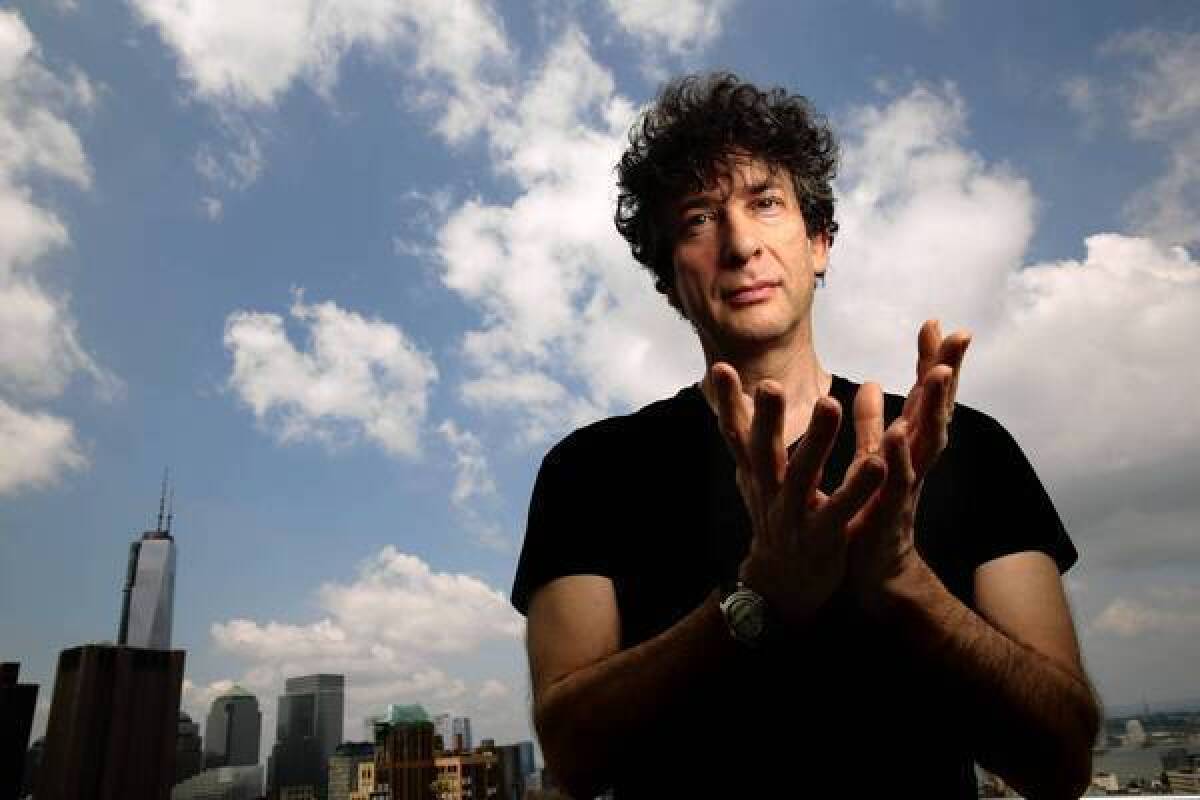Getting to know Neil Gaiman

AUSTIN, Texas — In Neil Gaiman’s passport case, on a scrap of paper beside his green card, are two verses of an unfinished work called “Pirate Stew.”
“I assume it’s for kids,” Gaiman said. “But it’s only two verses... and it just sits there, and every time I pull out my passport, I feel guilty that I haven’t done anything. One day, I will pull out my passport, get on a plane and go, ‘Ya know, I don’t have anything to do now for the next seven hours. I’ll write ‘Pirate Stew.’”
It’s hard to imagine the British-born Gaiman with time to kill — as a writer, he’s almost absurdly prolific. On June 18, Gaiman’s new novel, “The Ocean at the End of the Lane” (William Morrow: 192 pp., $25.99), arrives. A dark fairy tale about a bookish 7-year-old boy growing up in England with distracted parents and a neighbor who remembers the big bang, it’s the author’s first book for adults since his bestselling 2005 fantasy “Anansi Boys.”
Sign up for “Bookshelf,” our email newsletter
But that’s only because Gaiman, 52, has been working in umpteen other forms — in March, the BBC broadcast a radio play based on his 1996 TV series “Neverwhere”; in May, a “Doctor Who” episode he wrote aired in the U.K.; in September, his children’s book “Fortunately, the Milk” is due; over the spring, he wrote 12 short stories inspired by fan suggestions on Twitter as part of a project funded by BlackBerry. Gaiman is also writing the upcoming HBO series “American Gods,” an adaptation of his mythological 2001 novel; and Ron Howard is adapting his 2008 award-winning children’s title “The Graveyard Book.”
Only the heavily pierced hostess at busy Magnolia Cafe in Austin — where Gaiman was recording the audio book of “The Ocean at the End of the Lane” and participating in a panel at the South by Southwest festival in March — showed any sign of noticing the author. She snapped from dour to perky when he arrived.
For those who know him, including his more than 1.8 million Twitter followers, the author of the “Sandman” comic book series and the “Beowulf” movie is instantly recognizable — his wild, dark mane has inspired a Tumblr account, “lovingly dedicated to the terrifying wonder that is Neil Gaiman’s hair,” and his transatlantic accent is so distinguishable that fans joke his publisher has insured it.
Gaiman is remarkably accessible to his audience, quickly replying to their tweets and chronicling his thoughts in an online diary. But his new book allows readers to know Gaiman better than any that have come before it, he said.
“The Ocean at the End of the Lane” takes place in the Sussex countryside, where Gaiman grew up, and is told through a wistful middle-aged narrator looking back on his boyhood belief that “books are safer than other people.”
The inspiration for the story was Gaiman buying a Mini automobile about a decade ago and learning from his father what had happened to his family’s Mini when he was growing up — a boarder had stolen it and committed suicide in it. In the book, the suicide sets off a supernatural chain of events involving a family of three ancient-yet-ageless women who live in an old farm at the end of the lane.
“It’s not autobiographical, but the lead character is very much me age 7, in the geographical landscape that I grew up in,” Gaiman said. “It’s about memory and about family and magic, and it gets very scary and weird.”
Gaiman began the novel as a short story to explain himself to his new wife, musician Amanda Palmer, who was away recording an album. But as he wrote, the story took on a life of its own.
“I’d get up every day and go, ‘Well, it’s got to be finished by the end of the week, hasn’t it?’ And then the end of the week would happen and I was going, ‘Well, it’s not a short story, it’s obviously a novelette,’ and then I thought, ‘Well, it’s not a novelette, it must be a novella,’ and I did a word count and I went, ‘Bloody hell, this thing’s 56,000 words, that’s a novel. Not a long novel, but it’s a novel.’”
(Gaiman’s writing day, he confessed, “tends to be a very specific kind of balancing act between things that move me and things that people are screaming for.”)
Before early galleys went out to reviewers or, as is often the case, Hollywood agents and producers, Gaiman shared the book with a friend, “Atonement” director Joe Wright, who is set to direct it for Focus Features.
“It was very important to me that it be very English,” Gaiman said of the film adaptation. “I wanted an English director and an English production and also that it was made by people I like and trust. I knew the moment this thing went huge studio and huge director, then this little baby of mine that I loved was very likely to become something else, and I didn’t want that to happen. It would break my heart. It’s too close, too personal.”
Advance trade and online reviews for the book have been among the best in Gaiman’s career. (The cultural criticism site PopMatters said it “features a level of craftsmanship, focus, and control that we normally associate more with literary fiction than genre.”) Gaiman said he’s prouder of it than anything else he’s written.
Occasionally, the loopiness of Gaiman’s career throws off even his devoted fans. His last children’s book, “Chu’s Day,” a story for toddlers about a baby panda that sneezes, confused some readers on Amazon. A woman in Phoenix wrote in her review, “I pre-ordered this book because I love Neil Gaiman’s adult novels. It was a bit of a disappointment.... The pictures are great, but the story is really lacking.”
Gaiman threw his hands up in exasperation at the confusion his varying work sometimes creates.
“It’s not for you, it’s for 3-year-olds!” he said. “But if you’re a novelist and you write a big, scary, weird, mythological book like ‘American Gods,’ you should follow it up a year or two later with another one. You’re not meant to go all over the place and do everything.”
Gaiman has three grown children from a previous marriage, and his next children’s book is an ode to fathers — in it, a dad who goes out to buy milk is kidnapped by aliens, rescued by a time-traveling stegosaurus in a hot-air balloon and narrowly avoids being sacrificed to a volcano god named Splod. There are also ponies.
As productive as Gaiman is, something has to go. Since marrying Palmer in 2011, he finds that he doesn’t watch much TV anymore, because she doesn’t. Recently, the couple realized that they had never shown each other their favorite movies. In May, they addressed the problem by holding an event at the Brattle Theatre in Cambridge, Mass., to screen two movies apiece for each other.
“It guarantees that it’ll happen,” Gaiman said. The event also helped the theater raise money for a new digital projector and ensured that Gaiman and Palmer shared the experience with others.
Although as a boy Gaiman may have found books safer than people, as an adult he seems awfully comfortable in a crowd — the “Doctor Who” episode and BlackBerry projects, for instance, involved a great deal of collaboration. To record the audio book of “Ocean at the End of the Lane,” he enlisted help from his Twitter followers in finding recordings of old Sussex accents.
“Being a writer is solitary and monk-like,” Gaiman said. “You can sit in a room and write the funniest joke in the world and nobody’s gonna laugh and it’s just you and a blank sheet of paper in the morning and at the end of the day. I can only do that so much.”
More to Read
Sign up for our Book Club newsletter
Get the latest news, events and more from the Los Angeles Times Book Club, and help us get L.A. reading and talking.
You may occasionally receive promotional content from the Los Angeles Times.







